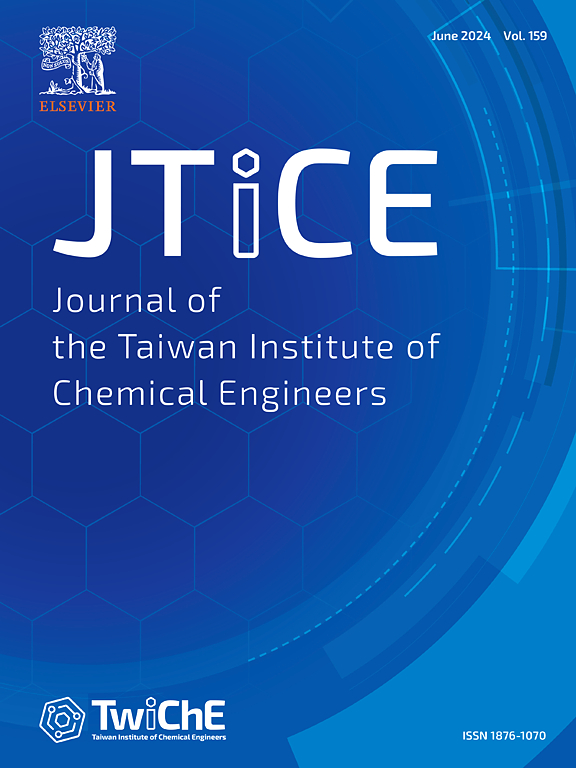Lattice Boltzmann simulation of magnetohydrodynamic double-diffusive convection hybrid nanofluid flow through solid blocks in a porous H-shaped enclosure
IF 5.5
3区 工程技术
Q1 ENGINEERING, CHEMICAL
Journal of the Taiwan Institute of Chemical Engineers
Pub Date : 2024-10-29
DOI:10.1016/j.jtice.2024.105807
引用次数: 0
Abstract
Background
Efficient heat transfer is vital in cooling systems to prevent overheating and maintain optimal performance. This study explores an H-shaped enclosure design incorporating conducting solid blocks and hybrid nanofluids (HNFs) based on a water-ethylene glycol (60:40) mixture. This coolant composition improves thermal stability by lowering the freezing point and raising the boiling point. The research focuses on magnetohydrodynamic double-diffusive natural convection (MHD-DDNC), analyzing the interactions between porous media, conducting blocks, and HNFs in the presence of a magnetic field.
Methods
Numerical analysis was performed using the non-orthogonal multi-relaxation time lattice Boltzmann method (NMRT-LBM). The D2Q9 scheme was applied for density and velocity, while D2Q5 was used for temperature and concentration fields. Key parameters such as Darcy number (Da), nanoparticle volume fraction (ϕ), buoyancy ratio (Br), Soret (Sr) and Dufour (Dr) numbers, thermal conductivity ratio (Rk), and mass transfer coefficient ratio (Rd) were analyzed to understand their impact on heat and mass transfer within the enclosure.
Significant findings
The results demonstrate that increasing ϕ and Br significantly enhances both heat and mass transfer rates, with improvements of up to 16.65% in the average Nusselt number () and 12.45% in the average Sherwood number (). Increasing Da intensifies horizontal velocity and enhances nanofluid circulation, leading to a 12.91% improvement in and a 9.59% increase in at ϕ = 4%. The Soret number reduces by 1.01% but rises by 26.65%, while the Dufour number yields the opposite. Varying Rk from 0.1 to 10 at ϕ = 4% increases thermal performance by 33.53% and mass transfer by 9.61%. Increasing Rd from 0.1 to 10 improves by 8.07% and by 31.53%, demonstrating the strong influence of these parameters on heat and mass transfer performance. These results highlight the potential applications for optimizing automotive cooling systems, regenerative exchangers, and HVAC heat exchangers.

多孔 H 型围墙中流经固体块的磁流体动力双扩散对流混合纳米流体的晶格玻尔兹曼模拟
背景高效传热对于冷却系统防止过热和保持最佳性能至关重要。本研究探索了一种 H 形外壳设计,其中包含导电固体块和基于水-乙二醇(60:40)混合物的混合纳米流体(HNFs)。这种冷却剂成分通过降低冰点和提高沸点来改善热稳定性。研究重点是磁流体力学双扩散自然对流(MHD-DDNC),分析多孔介质、导电块和 HNFs 在磁场作用下的相互作用。密度和速度采用 D2Q9 方案,温度和浓度场采用 D2Q5 方案。分析了达西数 (Da)、纳米粒子体积分数 (j)、浮力比 (Br)、索雷特数 (Sr) 和杜富尔数 (Dr)、导热系数比 (Rk) 和传质系数比 (Rd) 等关键参数,以了解它们对外壳内传热和传质的影响。重要发现结果表明,增加ϕ和Br可显著提高传热和传质速率,平均努塞尔数(Nu‾)可提高 16.65%,平均舍伍德数(Sh‾)可提高 12.45%。增大 Da 会增强水平速度并促进纳米流体循环,从而在 ϕ = 4% 时使努内特数(Nu-‾)提高 12.91%,舍伍德数(Sh‾)提高 9.59%。索雷特数使 Nu‾ 减少了 1.01%,但 Sh‾ 增加了 26.65%,而杜富尔数则相反。在 ϕ = 4 的条件下,Rk 从 0.1 到 10 的变化可使热性能提高 33.53%,传质性能提高 9.61%。将 Rd 从 0.1 增加到 10,Nu‾提高了 8.07%,Sh‾提高了 31.53%,这表明这些参数对传热和传质性能有很大影响。这些结果凸显了优化汽车冷却系统、再生交换器和 HVAC 热交换器的潜在应用。
本文章由计算机程序翻译,如有差异,请以英文原文为准。
求助全文
约1分钟内获得全文
求助全文
来源期刊
CiteScore
9.10
自引率
14.00%
发文量
362
审稿时长
35 days
期刊介绍:
Journal of the Taiwan Institute of Chemical Engineers (formerly known as Journal of the Chinese Institute of Chemical Engineers) publishes original works, from fundamental principles to practical applications, in the broad field of chemical engineering with special focus on three aspects: Chemical and Biomolecular Science and Technology, Energy and Environmental Science and Technology, and Materials Science and Technology. Authors should choose for their manuscript an appropriate aspect section and a few related classifications when submitting to the journal online.

 求助内容:
求助内容: 应助结果提醒方式:
应助结果提醒方式:


